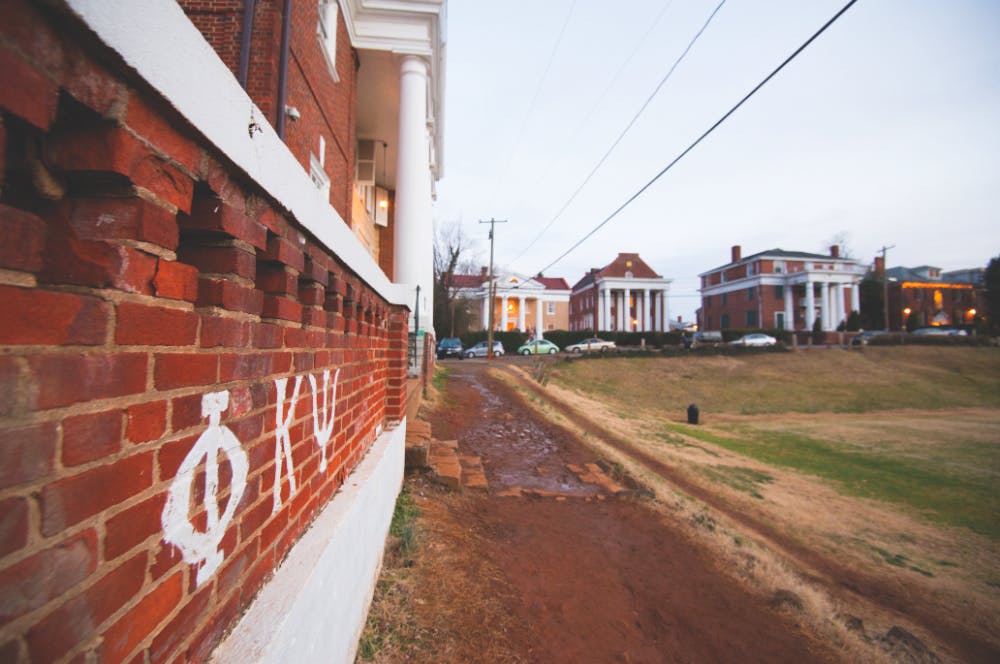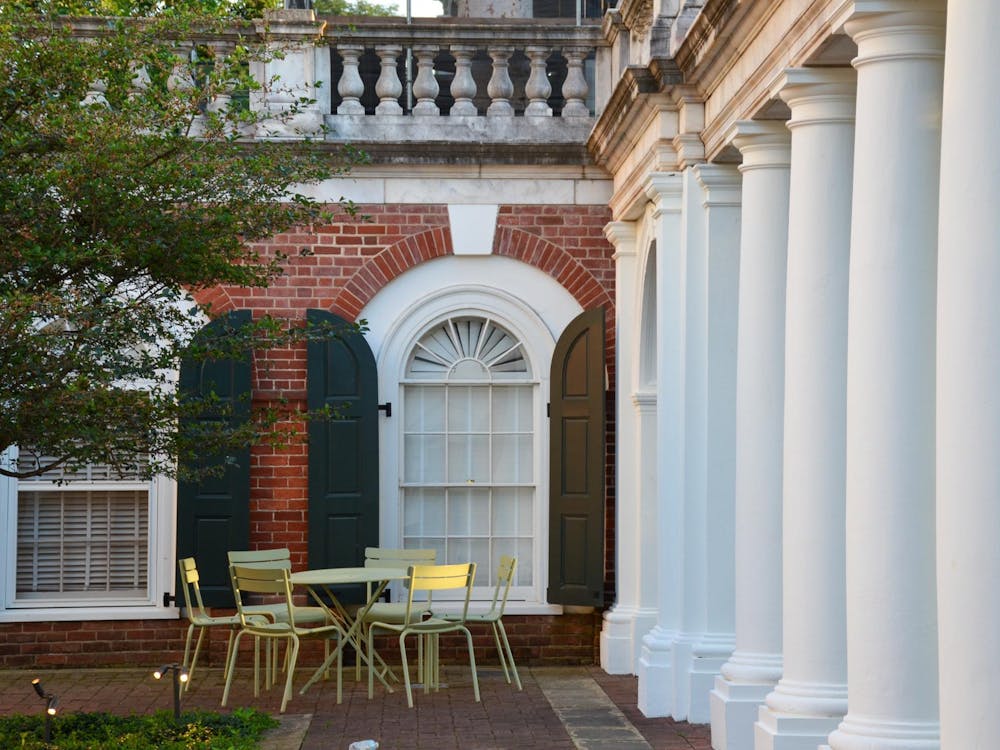For many students, the Rolling Stone saga began Wednesday, Nov. 19. The article, posted online that morning, prompted a series of protests and meetings, before being thrown under strict scrutiny after a host of discrepancies came to light in December. The narrative was capped in mid-January, when police said an investigation found no evidence that Phi Kappa Psi, the fraternity at the center of the story of an alleged gang rape of then-first-year student Jackie, was involved in the incident.
But for Stephen Scipione, a third-year College student and president of Phi Psi, things started months prior. A representative from his fraternity’s national organization flew to Charlottesville Sept. 17 — Scipione’s 21st birthday. In a meeting with chapter leadership, the representative asked about a gang rape allegation — a story he had heard from someone within the University administration.
“We basically just looked at each other and our mouths were just open,” Scipione said.
A follow-up meeting with the chapter’s 65 members went much the same way.
“You’d think that one person would maybe look down or not make an emotional face, but no — everybody was just completely, completely in awe,” he said.
The meeting was the beginning of what would be an unparalleled semester for Phi Psi — one that made their house, a building which towers over Mad Bowl, “the most infamous fraternity house in America,” as Scipione puts it.
The national chapter representative encouraged the fraternity to conduct an internal investigation. They did, but with few details about the allegations, there was only so much they could do.
"It was frustrating for a lot of people;
they had done nothing wrong, but they were
being indirectly punished.”
Bracing themselves for the article’s release, the fraternity worked to implement a series of reforms throughout the semester — limiting parties and going through trainings on sexual assault and bystander intervention.
“It was frustrating for a lot people — they had done nothing wrong, but they were indirectly being punished,” Scipione said. “But everyone took it very maturely. Given the situation, they handled it very, very responsibly — which I’m proud of.”
But weeks of planning and investigation did not prepare the fraternity for the onslaught of attention it received once the article spread throughout the University community and permeated national dialogue about rape, college student safety and Greek culture.
The article’s allegations, Scipione said, were “10 times worse than we were ever expecting.” He read the story early that Wednesday. The family friend of a fraternity brother had found a printed copy of Rolling Stone at Barnes and Noble a few hours before the article was published online.
“I’ll never forget that morning,” Scipione said. “I was not the first one to read it, but I was watching others read it. And it was tough. Seeing the look in their eyes. Most had to step out of the room to read it.”
They scanned the article’s pages and sent it out to the fraternity’s listserv — hoping to give brothers time to prepare for the wave of reactions which would overcome the University community.
Scipione said no part of him ever believed the story — he knew there were discrepancies and that Phi Psi could not have been involved. But after a meeting with two University deans, the chapter decided to voluntarily suspend itself — since a police investigation into the incident, requested by University President Teresa Sullivan, meant the chapter would not be able to keep its good standing with the University.
“We decided that the best plan of action was to voluntarily suspend ourselves — not as a symbolic thing, but it was the right thing to do to cooperate,” he said. “And that’s the stance that we’ve taken the entire time — cooperating with the school and more importantly with the Charlottesville police.”
"A lot of guys did not feel comfortable
going to class, especially when you have
teachers speaking out against our fraternity.”
For many of the brothers, the ensuing days were hellish. Not wearing fraternity T-shirts was a given. Anonymous vandals threw a brick through their house’s window and graffitied a wall outside their home with the words, “UVA Center for Rape Studies.” Multiple protests took place outside the fraternity house — including one which saw several individuals arrested for trespassing after they refused to leave house’s front steps. Many fraternity members — Scipione included — stopped going to their classes.
“A lot of guys did not feel comfortable going to class, especially when you have teachers speaking out against our fraternity,” he said. “And you have these students showing these acts of violence on our house — and it was almost like it was condoned, knowing that there had never really been a follow-up on that, at the time.”
He said he is not expecting an apology from anyone for the way Phi Psi was villainized in the weeks before the discrepancies were made public — though he said he would like to see some “formal recognition” from Rolling Stone.
Brothers who stayed behind slept in
one room — the "furthest possible
point from any windows or doors.”
“We’re not the victims here, and that’s important to remember,” he said. “It was tough for those couple weeks — there’s no denying that. But there’s a much bigger story here.”
Brothers did receive some support — from members of other Greek houses and chapter alumni, along with family and friends. But the community, Scipione said, seemed to be accepting the allegations and the actions of the vandals.
A police investigation into the vandalism is still ongoing, Charlottesville Police Capt. Gary Pleasants said last week.
"I received countless death threats.
It was tough reading some of the
emails I got, I'll give you that.”
Brothers quickly left the house, with only a handful of the 18 choosing to stay behind. Most stayed in hotels or on friends’ couches. The few who stayed all slept in the same room — “the furthest possible point from any windows or doors,” Scipione said.
But even moving and skipping classes could not shield brothers from all the negative attention.
“I received countless death threats,” Scipione said. “It was tough reading some of the emails I got, I’ll give you that. And not knowing what to say. It’s tough to see those and not be able to say anything back.”
Within 24 hours, the fraternity conducted a review of the claims in the article — noting several discrepancies — and handed their documentation to Charlottesville Police. But they did not release a statement noting the findings until Dec. 5, when they received the go-ahead from investigators.
That same day, Rolling Stone released a statement acknowledging there were discrepancies in the story, and the Washington Post published an article which cast doubt on several key aspects of Jackie’s reported assault.
“That was probably the busiest day out of the entire last semester,” Scipione said. “In a good way. Guys were happy, but at the same time, it wasn’t over with.”
"It was nowhere near an exoneration
like it should have been.”
Though the media and public eye quickly turned to a more critical evaluation of the article’s central claims, Scipione said the relief was only partially satisfying.
“It was nowhere near an exoneration like it should have been, and most of the brothers had known that information for a long time — it wasn’t a secret,” he said. “But it was nice to get the word out and kind of move the story in a different direction, away from us. There’s no denying that it was a relief of some sort, but at the same time we all knew that there was a lot to be done and there’s a lot left in the story.”
Scipione worked with the University during Winter Break to ensure the fraternity’s name could be cleared more formally before the start of fraternity rush — which began Jan. 15. Police officially cleared the fraternity of any involvement Jan. 12.
Rush, which finishes up this coming weekend, went decently well for Phi Psi. There was a drop-off in the number of students who expressed interest in the fraternity, but Scipione said he expects to have as strong a pledge class as every other year.
The fraternity, as a whole, is looking forward to putting last semester behind it and returning to some level of normalcy.
“It’s going to take some time to get our feet back on the ground,” Scipione said. “Last semester was a pretty big blow for us. And a lot of guys are worn out and burnt out and want to return to normal. But there is still a lot of work to be done and we can be a big catalyst to that.”
The fraternity played a big role in the development of the new Fraternal Organization Agreement, which all fraternities signed onto at the beginning of the semester. The regulations, Scipione said, will take some time to adjust to, but will ultimately help to make parties safer for students.
"Nobody should ever be put in that
position. I don't know why we were.
I still lose sleep wondering why.”
The administration’s decision to ban fraternity social activities in the intermediate time, he said, was understandable given the pressure it was under. Though he said he was disappointed in the community’s rush to judgment, there may even be a silver lining in the chaos of the past few months.
“Nobody should ever be put in that position,” he said. “I don’t know why we were. I still lose sleep wondering why. But everybody has learned from this, and they will move on and they will be strong people.”
Though it may take some time for a complete routine to business as usual, this semester has been a welcome change of pace for Phi Psi brothers.
“Living in the house was the first thing that we noticed,” Scipione said. “We’re comfortable, we feel safe. We don’t have to worry about the threats, we don’t have to worry about sleeping at night.”
The organization has not yet decided whether it will pursue any legal action in the coming weeks. That dialogue will happen between the chapter members, the national organization, and the fraternity’s housing corporation — but Scipione said he wants to finish the rush process first.
"We're ready to get through this
semester, through rush, get a
good pledge class, and move on.”
“We do not have a game plan as of right now — we’re considering all of our options,” he said.
Ongoing concerns about damage to their reputation aside, the fraternity is in a strong place moving forward, Scipione said. Brothers are comfortable wearing letters around Grounds, putting their affiliation on their resumes and holding rush events.
“It’s been a miserable semester for everyone — an unfortunate one — but we survived, came out stronger than we were before,” he said. “We’re ready to get through this semester, through rush, get a good pledge class and move on.”







